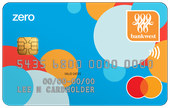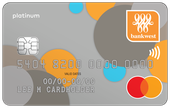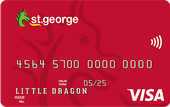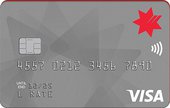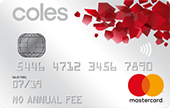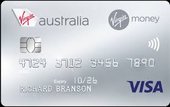You might want a credit card that can be kept in reserve for emergency use. For many Australians, that's a no annual fee credit card. Here's what to look out for and how to choose one.
What is a no annual fee credit card?
Where other cards may charge annual fees in the range of $30 to $1,450 (and even more for prestige business cards), credit cards with no annual fees charge precisely $0. They conform to exactly what it says on the tin: you won't be charged an annual fee for having a credit card account and using the card for purchases, bill payments or cash advances.
All Australian credit cards come loaded with technology, in the form of NFC contactless payment ('Tap & Go') and in most cases mobile contactless payment (i.e. they can be used with Apple Pay and Google Pay), plus high security features (chip and PIN, security codes delivered by SMS, fraud monitoring). In these respects no annual fee credit cards do not differ from the most expensive credit cards on the market. But the similarities stop there.
Most credit cards that come without an annual fee also come without rewards or frequent flyer points, and without extensive complimentary benefits (e.g. travel insurance, airport lounge access, free flights). They are aimed at the budget end of the market, or beginner credit card users, and are a good way to find your feet in the world of credit cards without spending too much.
However, there are a few – but only a few – rewards and frequent flyer points cards, or cards with some limited complimentary benefits, with no annual fee.
Annual fee waived vs no annual fee
You may notice that some cards listed on this page have no annual fee for the first year. These are cards that have had their annual fee waived, usually for the first year. Banks waive annual fees to attract new customers who may be deterred from signing up by the annual fee. Cards with waived annual fees usually have an introductory offer of some sort, for example, an interest-free balance transfer, no interest on purchases, or rewards.
By comparison, some cards have no annual fee ever. Generally, these cards tend to be very basic in terms of their features and offers, although some have rewards.
What is the best no annual fee credit card?
Nearly every bank in Australia offers a credit card with no annual fee on an ongoing basis or for the first year. Given the choice and the fact that no two people are in the same financial position, there can be no single best no annual fee credit card.
That being said, there are a number of questions to ask when considering your options and deciding which is best for you.
- What do value most? Do you just want a basic credit card with no annual fee?
- Will you be spending on it? If you are, then you could look for cards with low interest in case you leave a balance to carry over.
- Do you want to earn rewards? While they are few and far between, no annual fee credit cards with rewards do exist. If you plan on using the card, perhaps it's worth earning something back... even if it's not with the best earn rate.
- Do you want to transfer a balance? If so, a balance transfer credit card with an annual fee but a long interest-free period may save more money.
Are there no annual fee credit cards with rewards?
For some, the ideal credit card is one that has no annual fee and earns rewards per $1 spent. These cards do exist and, when paid off in full each month, can mean earning rewards with no additional cost.
However, there is a trade-off.
Annual fees are charged by the bank to cover the cost of the perks and benefits often associated with rewards credit cards. Therefore, you can expect a credit card with rewards and no annual fee to have a reduced earn rate per $1 spent, a smaller (or no) sign up bonus, and no added benefits such as lounge access and insurance.
If you put most of your everyday purchases and bill payments through your credit card, you might actually be better off choosing a card with a higher earning rate, even if you do have to pay an annual fee.
It's up to you to decide whether the trade-off is worth it.
Is a no annual fee credit card free?
If a credit card has no annual fee and you do not use it, or pay off the balance in full each month so that you don't earn interest, then it is technically free.
However, no annual fee does not mean no fees or interest will ever apply.
- If you don't pay off your balance every month, you'll be charged interest at the purchase rate.
- You'll still be charged interest and probably a fee too for cash advances.
- If you miss a payment, you'll be charged a late fee.
- If you go over your credit limit, you'll probably be charged a fee for doing so.
$0 annual fee credit card pros and cons
Even though a credit card may have no annual fee, consider the benefits you won't have against the money saved.
Pros
- There's no annual fee. Not having to pay an annual fee can save hundreds — potentially thousands — of dollars.
- Limited rewards. While there isn't much to choose from, you can earn rewards points on a card with no annual fee.
- Useful in emergencies. If you don't use the card and it costs nothing to keep, you can put it away for a rainy day.
Cons
- Lack of perks and benefits. With no annual fee being charged to cover their costs, most banks won't include perks like insurance or lounge access.
- Lower earn rates. If a credit card has no fee and earns rewards, you can expect the earn rate to be lower than is standard.
- No introductory offers. It's unlikely for a credit card to have no annual fee and an introductory balance transfer or interest-free purchases.
Who no annual fee cards suit
You'll probably benefit from a 'no annual fee' card if you are the sort of person who only intends using their credit card to fund unexpected emergencies such as car breakdowns, occasional online purchases or for when travelling overseas. In this situation a card that doesn’t charge any account maintenance fees can save you a nice chunk of money. Also, if you don’t intend to use your card regularly then features like rewards programs may simply be a waste of time, as you have to spend quite a lot to earn enough for any sizeable return.
And if you're just starting out on your financial journey – a student perhaps, or someone in their first real job – a card with no annual fee is a good way to get used to handling credit without worrying about paying for the privilege of earning reward points. There will be plenty of time for that later.
Who no annual fee card don't suit
You probably won't benefit from a 'no annual fee' card if you expect to spend $15,000 or more a year using your credit card, plus you intend to always pay off your monthly account balance in full and you're prepared to keep track of reward points.
Spending this amount means that you should be able to earn at least 15,000 reward points per year, even with a slow-earning card, and even if you redeem your points for retail gift cards they should still be worth about $75 (i.e. around 0.5 cents per point). So you could afford to pay a $75-$80 annual fee for a card that may have other valuable benefits attached. And if you think you'll spend more than $15,000, you could unlock points earning and benefits worth well in excess of your annual fee.
